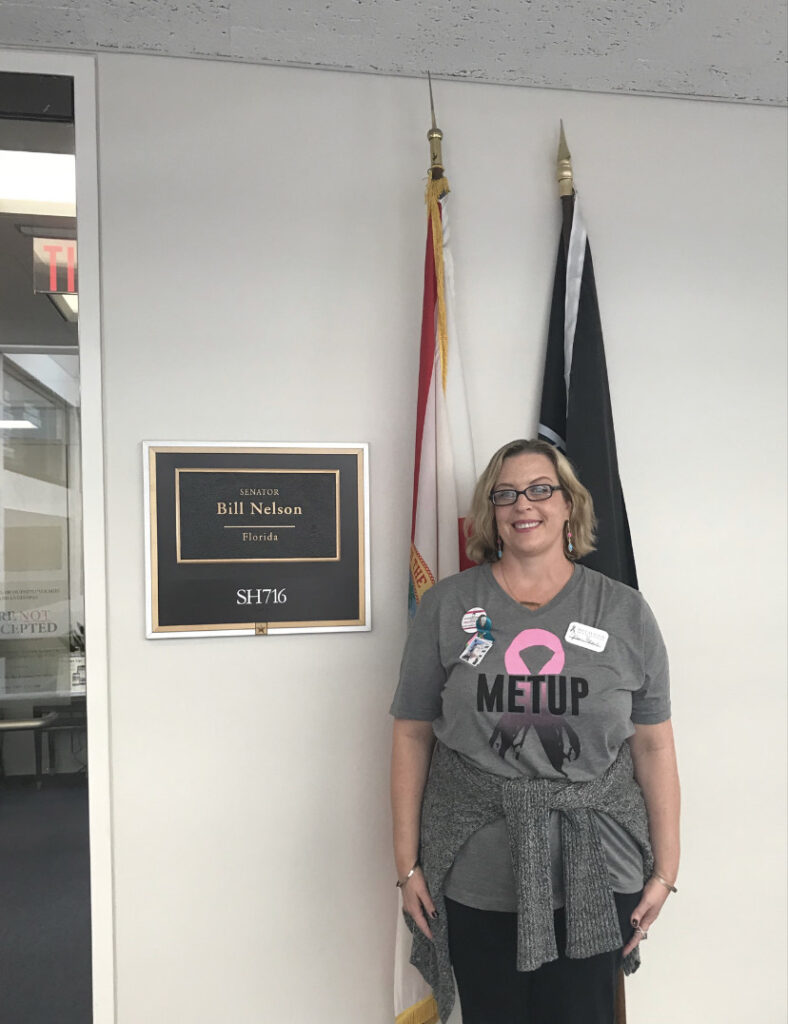By Jennifer Pace
Throughout October, many Floridians will show their colors by participating in pink ribbon campaigns to fight against breast cancer. However, amid the deserved focus on this terrible disease, there remains a huge lack of awareness and research funding surrounding its only form that kills: metastatic breast cancer (MBC).

This month, which included National Metastatic Breast Cancer Awareness Day (October 13), is an ideal opportunity to learn more about this form of cancer – which claims the life of 116 people every day in the United States – and what can be done to fight it.
MBC, often known as Stage IV cancer, is breast cancer that has spread beyond just the breast to another part of the body, such as the brain, lungs, or liver. I have lived with this form of cancer for over eight years now. After six major surgeries and aggressive chemotherapy, I’m lucky that my scams currently show “No Evidence of Disease” (NED). Unfortunately, that doesn’t mean I’m cancer-free – MBC is incurable. I’m a “lifer” and face chemotherapy treatments every 21 days, along with the terrible side effects.
However, I recognize that my NED status can change at any time, so I dedicate my remaining days to advocating to have the National Cancer Institute adequately fund MBC research. I’ve endured the devastating loss of six close friends within the past six weeks to this deadly cancer, and I’ll do anything I can to help prevent others from losing their lives.
Sadly, widespread pink ribbon campaigns alone are not saving any of them. We are literally dying for a cure, but many pink ribbon campaigns actually donate very little funding to clinical research trials. Billions are raised by these campaigns each year, and only 7% of the funds are allocated toward research as a whole. Of that, only 2% goes toward MBC research.
The majority of the funds go toward “awareness,” but most of us are fully aware of breast cancer. It’s so important to identify what portion of the money will go toward lifesaving research when you consider making a donation during these campaigns. Direct your generosity to an organization that devotes at least 30% of its resources directly to efforts for a cure. I know of a couple patient-led nonprofits and events that even donate 100% of their fundraising to MBC research, such as a free Nov. 28 virtual event hosted by the Orlando Metsquerade, a local chapter of METAvivor that I’m on the board of.
Patients like me truly appreciate the effort and support that communities aim to show when participating in pink ribbon campaigns. We recognize that most don’t understand the harm of “pinkwashing,” when organizations pocket the profits from selling pink ribbons.
What both current and future MBC patients really need is for research into a cure to be funded. Early detection of breast cancer is invaluable, but it does not guarantee becoming healthy or cancer-free. Of those diagnosed with early-stage breast cancer, 30% will develop MBC – sometimes even years after being in remission or told they have “beaten” cancer.
Those with MBC face many different challenges than do those with early-stage breast cancer, because we are running out of treatment options. We deserve policies and practices that improve care and properly fund advances in treatment options. Our communities and policymakers should work together to ensure that MBC patients have access to the best care and treatment available. This care should also be affordable – regardless of a patient’s insurance, income status, or stage of disease.
With adequate funding for research and clinical trials, MBC could go from a deadly disease to a chronic condition. Many lives are on the line as we wait for advances in the treatment of our disease. Instead of sporting a pink ribbon this month, please take some time to learn about MBC and how you can help ensure that lifesaving research for it is funded.
Jennifer Pace is an eight-year metastatic breast cancer patient living in Tampa, Florida. She is on the board for the Orlando Metsquerade, a chapter of METAvivor.
